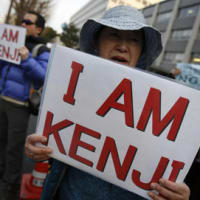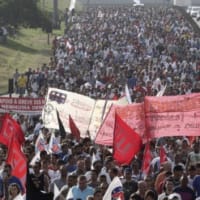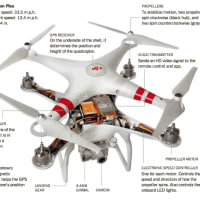
In Brazil, A Once-High-Flying Economy Takes A Tumble
かつて好況を謳歌したブラジルの経済が躓いている。
January 14, 2015 3:14 AM ET
これからの世界経済のけん引力の中心と言われたBRICのブラジルやロシアが深刻な経済停滞に陥っている、どうも世界経済のサイクルは随分周期が短くなっているような気がするのだが・・・さて、日本は本当に東京オリンピックを梃子に経済を回復のトラックに戻せるのだろうか?
It was a terrible Christmas season for stores in Brazil. For the first time in more than a decade — since 2003 — sales went down.
ブラジルは2003年以来、この十年間で最もひどい売上のクリスマスシーズンだった
Roberta Pimenta owns a small shop selling children's clothes at the Butanta mall in Sao Paulo, which is aimed squarely at the middle-class shoppers who live in the area.
"It was the worst drop in sales since I've had this store," Pimenta says. "In seven years it was the worst year I had. And every year you have a 10 percent increase of employees' salary, 10 percent increase in the rent, 10 percent in everything, so it is horrible."
Pimenta says sales haven't picked up since the holidays — she has lost money this year as well.
ロベルタ・ピメンタはサンパウロの中流層の店主が集まるブタンタモールで子供服を販売する商店主だ。「この店を開店して以来最悪の売上だったわ」と彼女はこぼす。 「この7年間で最低の売上なのに、従業員に支払う給与や家賃等ありとあらゆるものが毎年10%ずつ上がるんだもの。まったくお手上げ」 このクリスマスシーズンでも売上が上がらず、今年は大きな損失を抱えてしまった。
Planet Money: When Fake Money Saved Brazil プラネットマネー:贋金がブラジルを救ったとき
Back in the early and mid 2000s, Brazil was flying high. There was a boom in easy credit in the country, and the creation of an avid consumer class. Global investors were putting their money in Brazil, running away from ailing Europe and America, which were going through the great recession. And China was buying a lot of what Brazil was selling — soybeans and other commodities.
2000年の初期から中期を振り返ってみると、ブラジルは好景気に沸いていた。 国中で安易なクレジットが横溢し、購買力旺盛な消費者層が形成されていた。 世界中の投資家は不況に襲われて病んだ欧州や米国から資金を引き揚げ、こぞってブラジルに投資した。 中国にいたってはブラジルが売り込む大豆やその他商品を多量に買い占めていた。
Today the story is very different, says Luiz Carlos Lemos, Jr., an economist at MacKenzie University, a Presbyterian college in Brazil named for its American founding donor.
"Looking in the short term, the expectation is that we will have a tough economy," Lemos says. "There won't be much consumption, much growth, no better income distribution, and we will have an inflation that will be exploding over our heads."
現在、話は全く違ってきていると経済学者のルイス・カルロス・レモスJr.は言う。彼はアメリカ人の創立基金提供者である名前を冠した、ブラジルのプレスバイタリアン大学の経済学者である。 「短期的にみて、我々の経済は強いという期待があったが、それほど消費も伸びず、経済成長もせず、収入の伸びもなかった、それなのにインフレだけは猛烈に進んでしまった。」
A Warning For Latin America's Faltering Economies: 'Innovate Or Die'
ラテンアメリカの危なっかしい経済への警告: イノベーションさもなくば破滅
China isn't buying as much, international investors are putting their money back into the recovering U.S., and Brazilians have taken on a lot of debt. And prices there are sky-high: An iPhone 6, for example, costs nearly $1,800.
The one bright spot had been that, despite slowing growth, unemployment has remained low. But that might be changing.
中国はもはや良い買い手ではなく、世界の投資家たちは経済の回復基調にあるアメリカに資金を戻し始め、ブラジル人には多くの借金だけが残されてしまった。おまけに物価は天井知らず。 例えばアイフォーン6はなんと1800ドル(21万円)近くもする。唯一明るい材料といえば、低成長にも関わらず失業率が低くとどまっていたことだが、それも変わりつつある。
Take car sales, for instance. They, too, fell in 2014 — down 7 percent for the year, and now layoffs are following. Thousands of people showed up this week in Sao Paulo to protest hundreds of firings at some of the region's biggest car factories. Workers are also on strike at Volkswagen, where jobs have just been cut.
車の販売を例にとれば、2014年に7%の販売ダウンで、それに伴う労働者の解雇がみられる。サンパウロで今週、ある地区の最大の自動車工場での数百人規模の解雇に抗議する数千人規模の集会があった。 フォルクスワーゲン工場でも幾つかの仕事の削減に抗議して労働者のストライキが見られた。

Workers of Mercedes-Benz, Ford Motor and Volkswagen gather as they block the Anchieta highway in Sao Bernardo do Campo, near Sao Paulo, Brazil on Monday. Thousands of metalworkers in Brazil marched on a highway outside of Sao Paulo to protest layoffs by carmakers expecting little or no rebound from a sharp 2014 downturn, adding to a mounting crisis in a politically sensitive industry.
月曜日には、ベンツ、フォードそしてフォルクスワーゲンの労働者達がブラジルのサンパウロ近郊のサンンベルナルドのアンチエタハイウェイを封鎖した。数千ものブラジルの金属工場労働者はサンパウロ郊外のハイウェイをデモ行進し自動車工場のレイオフに抗議した。彼らは2014年の売上の急落からの回復を全く期待していない。自動車産業は政治的にセンシティブな産業だけに危機感を一層募らせている。
Umberto Panini, a mechanic who works at Volkswagen, still has a job but admits he is worried.
"It would worry anyone," he says in his family's small townhouse close to the factory. "We feel insecure. It makes us not do certain things we might do because we are worried about money."
He and his wife Michele just had a daughter. Michele lost her job as a credit analyst right before giving birth, so they are living on one income — about $3,000 a month, a pretty good salary in Brazil.
ウンベルト・パニーニはフォルクスワーゲンで働くメカニックだ。彼にはまだ仕事があるが不安の色は隠せない。 「例外なく皆不安ですよ。」と彼は話す。 彼の家族の家は工場近くにある。「我々は不安を感じている。 だから金の心配で普段やることも控えているよ。」
彼と彼の妻ミケーレには娘が生まれがばかりだ。 ミケーレはクレジットアナリストの仕事を出産直前に失ってしまった。だから今は夫の給料だけで暮らしている。彼の月給は3000ドルでブラジルではそれでも良いほうだ。
They say that this year instead of traveling abroad this year — in previous years, they've been to Spain and Chile — they will be vacationing inside the country. The Brazilian currency's slide has made travel less affordable.
In the past decade, the economic boom in Brazil lifted millions of people out of abject poverty — incomes rose, so did standards of living, and inequality dropped. But in previous downturns, there has been hyperinflation and even real privation.
Umberto Panini and his wife say they will be a little more cautious with their money now. But they own a house and a car, and remain optimistic about their prospects — and Brazil's.
彼らは、今年は海外旅行をあきらめて(去年はスペインとチリに旅行した)国内旅行にすると決めている。 ブラジル通貨安は海外旅行のメリットを消してしまっている。過去の10年間で起きたブラジルの経済ブームは多くの人々を極度の貧困から救い、収入を増やし、生活水準を上げて、格差は縮まったのは事実だが、昨年の経済悪化でハイパーインフレとひどい収奪をもたらされた。 ウンベルト・パニーニ夫妻は、今は金遣いを少しセーブしているが、自家用車とマイホームをもっており、自分たちとブラジルの将来についてはまだ楽観的だ。




















※コメント投稿者のブログIDはブログ作成者のみに通知されます